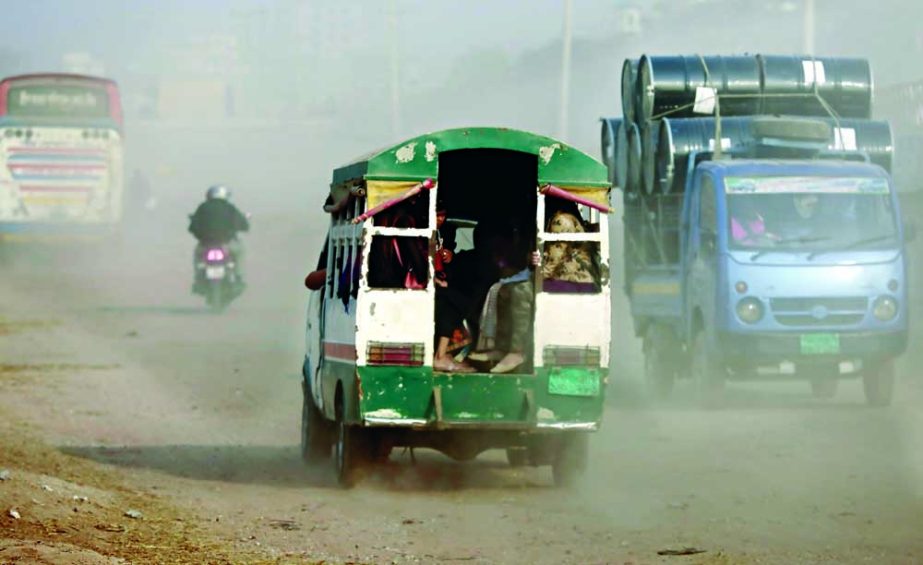
Reza Mahmud :
‘Very unhealthy’ air of the capital Dhaka has created serious hazardous living environment in the city but the causes of the pollutions remained unchanged.
Experts said were High Court’s earlier directives in this regards ignored which was the major reason behind continuous and increasing air pollution in the city.
“Earlier, High Court directed taking of necessary measures to curb perilous air pollution in the city. The directives included spraying water and cover all construction materials and digging places during any type of renovation or construction work. But every things is ignored,” Professor Dr. Ahmad Kamruzzaman Majumder, Chairman, Department of Environmental Science, Stamford University, Bangladesh told The New Nation.
In the winter, the city’s air quality deteriorated sharply due to the massive discharge of pollutant particles from construction work, rundown roads, brick kilns and other sources.
On spot visits, it has been found that construction work is going on in different areas without covering materials.
In Kayettuli area in the old Dhaka, road digging is going on without taking necessary measures to curb dusts.
Professor Kamruzzaman said, “Dusts are used to mix with moisture in air during the winter evening and night. As a result those dusts turn down stage of the air and used to the people intake with breathings. Besides the dusts, there were lead and other harmful materials are also floating in the polluted air and intake by the people which are causing untold hazardous.”
Experts said air pollution increased mortality from heart disease, stroke, lung cancer, acute respiratory infections and chronic obstructive pulmonary disease.
According to the World Health Organization (WHO), air pollution kills about seven million people worldwide every year from such diseases.The High Court has criticised the authorities concerned of the government for their failure in taking effective measures to control air pollution in Dhaka and surrounding areas despite its repeated directives.
“Public health is at serious risk due to air pollution. The situation is not improving although this court has delivered several directives in this regard. In this situation the court cannot sit idle,” the HC Bench of Justice Md Ashfaqul Islam and Justice Md Iqbal Kabir said during hearing a writ petition on Tuesday.
The Bench directed the director general of environment department and deputy commissioners of five districts — Dhaka, Munshiganj, Narsingdi, Narayanganj and Manikganj — to be connected with it during next hearing of the petition on February 15.
The HC also asked them to submit separate lists of illegal brick kilns before the court on that day.
The writ petition was moved by lawyer Manzill Murshid on behalf of Human Rights and Peace for Bangladesh (HRPB).
Meanwhile, the HC on February 4 last year asked the DG of Fire Service and Civil Defence to take necessary steps to spray water from its vehicles on urgent basis at the entrances of the capital including Gabotli, Jatrabari, Purbachal, Keraniganj and Tongi.
Sources said, air of the city was classified as “poor” or “very unhealthy” and it ranked the second worst in the Air Quality Index (AQI) on Sunday.
Dhaka’s AQI score was recorded at 212, while Pakistan’s Lahore and Afghanistan’s Kabul placed the first and third spots with AQI scores of 221 and 190, respectively.
The Department of Environment (DoE) and the World Bank revealed in a joint finding in March 2019 that the three main sources of air pollution in Dhaka were brick kilns, dust from construction sites and smokes from vehicles.

